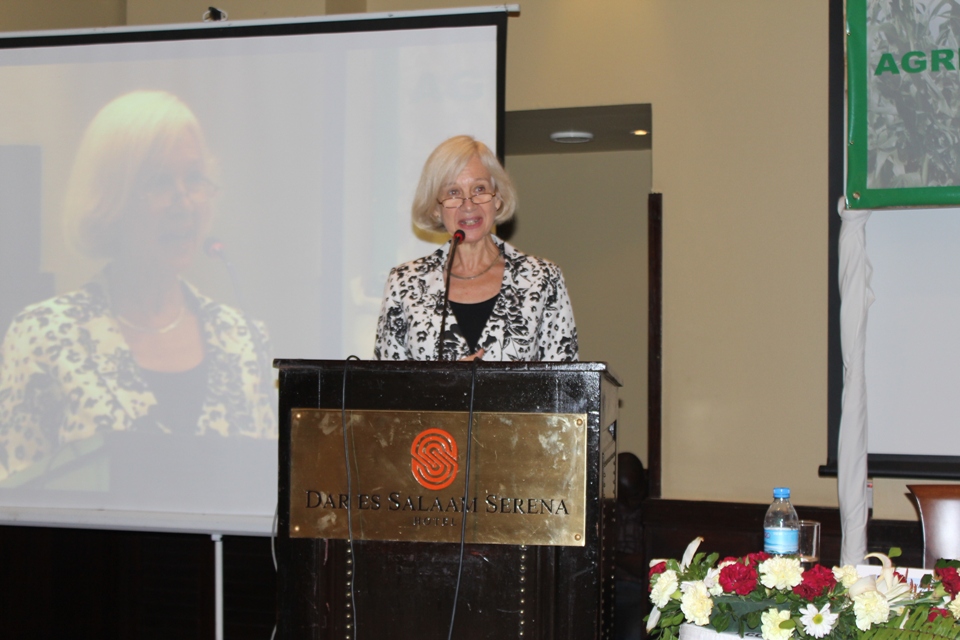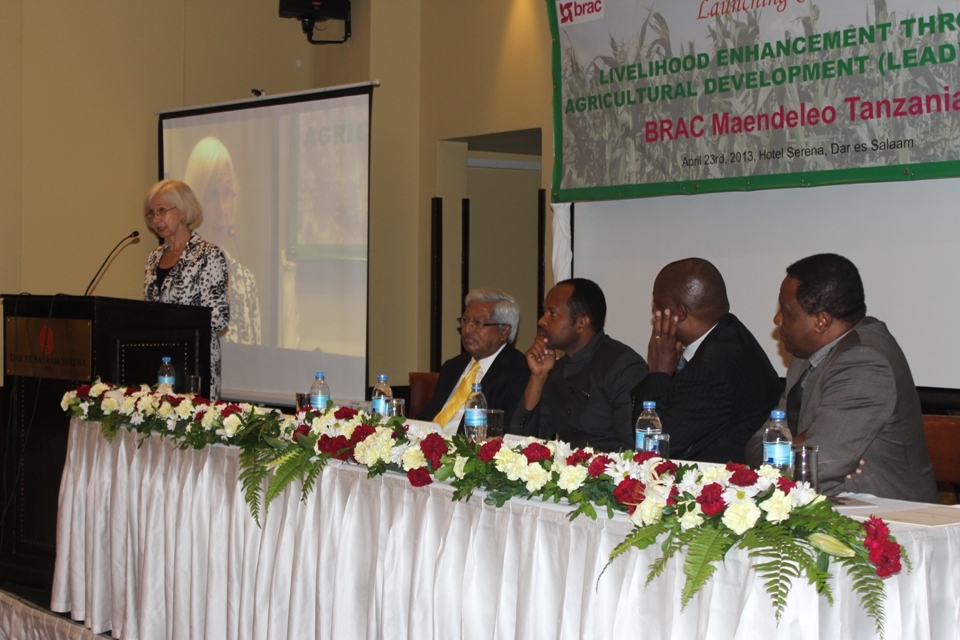British High Commissioner's speech on launch of UK programme
The programme, funded by the Department for International Development, will work to strengthen markets and improve farming practices in Tanzania.

Honourable Ministers of Agriculture and Livestock, Hon. Chair, Sir Fazle Abed; Senior staff of BRAC, ladies and gentlemen:
I am delighted to be here today, at the launch of BRAC Maendeleo’s “Livelihood Enhancement through Agricultural Development” Project, which is being funded by the UK Government, through the Department for International Development. This is a substantial programme which will work with more than 100,000 maize, vegetable and poultry farmers to strengthen markets, and to improve farming practices. The programme will run for 4 years from this month, and the UK investment totals £ 8.7m, or US $ 13.5m.
My enthusiasm for this project is based both on its relevance for Tanzania, and on its partnership with BRAC - one of the premier development institutions in the world. I know this from personal experience. Throughout the 1980’s and 1990’s I worked for Oxfam lobbying for policy changes to improve the lives of poor people. I have long admired BRAC for its transformational role in helping the rural poor, particularly women.
In the health field, BRAC is renowned for its role in making life-saving medicines (like oral rehydration) accessible to poor people. I saw this at first hand when I carried out research in Bangladesh for a book called “Bitter Pills”. This documented marketing abuse by international pharmaceutical companies that were selling inessential and inappropriate drugs. By increasing access to essential medicines, and influencing policy, BRAC was certainly a key part of the solution.
My development career took me from Oxfam to DFID, where I worked on international trade issues. Coming to Tanzania brings me to a country where trade is of growing importance, and where there is great potential to increase inter-regional trade. And BRAC, in working in agriculture, can help to support agricultural development which is a central plank of the Government of Tanzania’s programme for growth, employment, and economic development.
Since 2008, Tanzania has achieved impressive GDP growth averaging 6.7%. Agriculture has grown more slowly than the services and manufacturing sectors (particularly transport, communications, financial services and trade). But, three-quarters of Tanzania’s employment is currently in agriculture. So, in the short-term at least, labour-intensive growth will come through improvements in agricultural development.
Since 2010, the UK’s Department for International Development (DFID) has intensified its agricultural development activities in Tanzania. Building on our support to the rice and sesame sectors in Mtwara and Lindi regions, we are now also involved in cotton in the Lake Zone. DFID’s support to SAGCOT (the Southern Agricultural Growth Corridor) is expected to bring investments in warehouses for rice and maize, and in tea and forestry.
The UK is one of a number of sources of investment in commercial agriculture in Tanzania. And UK Trade & Investment (UKTI), along with the High Commission and DFID are working to encourage further UK agricultural investment. This will in turn build markets in rural Tanzania, and have an impact on the markets targeted by the BRAC LEAD programme.

British High Commissioner Dianna Melrose giving the speech
The UK is pleased to be funding the LEAD programme for 3 particular reasons:
-
Firstly, the programme will have very extensive outreach to rural areas throughout Tanzania. It will operate in 34 of Tanzania’s 120 Districts, within 18 of Tanzania’s 30 regions. Over the 4 year programme, it will have an impact on 104,000 households by December 2016. The programme will make it easier for farmers to market their products at better prices, and to buy better inputs. Farmers will produce 50% more maize, vegetables, chickens and eggs, and will establish closer links with input providers and buyers in larger markets.
-
Secondly, BRAC has an impressive record in delivering on-the-ground development, in Bangladesh and 10 other countries around the world. In 5 years, BRAC’s microfinance operations grew to be the largest NGO microcredit provider in Tanzania. BRAC has an excellent track record of working directly with smallholder farmers, particularly women. And this experience elsewhere in the world is expected to bring similar benefits to Tanzania.
-
Thirdly, by focusing on maize, vegetable, and poultry production, BRAC’s LEAD programme is designed to have a tangible impact on women farmers in distant rural areas of Tanzania. Within its target group, 65% are expected to be women farmers.
The LEAD programme itself has learnt from a pilot phase, which was funded by the Bill and Melinda Gates Foundation. This pilot showed that trained farmers could achieve increases in incomes of over 100%, with, for example, income from the sale of eggs increasing by 63%.
Before concluding, I would like to address the Chair in particular. I am confident I can say that Sir Fazle Abed is a great friend of Britain. We are certainly great admirers of Sir Fazle and his pioneering work with BRAC. He was awarded one of the highest honours by the Queen (KCMG) in recognition of his services to reducing poverty around the world.
DFID was an early funder of BRAC’s innovative microfinance programmes, and their success very soon made our efforts in that sector redundant. For those who are meeting Sir Abed for the first time, I am sure you will agree that we are privileged to have him here. I hope he is able to continue to take a close interest in this programme over the next 5 years.
Finally, and importantly, the other major partner in this BRAC programme is of course the Government of Tanzania. I look forwarding to hearing from the Hon. Ministers for Livestock Development and Fisheries, and for Agriculture, Food Security and Cooperatives. BRAC will be working closely with government Extension Officers during the 5 year programme. And through this partnership, the UK is confident that rural farmers will see real benefits from productivity improvements.
On behalf of the UK, I extend my thanks to the ministers and their departments which will help determine the success of the LEAD programme.